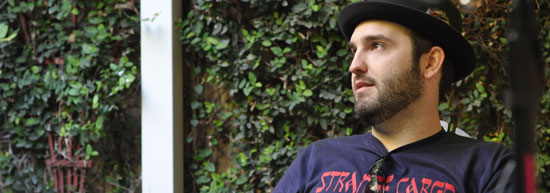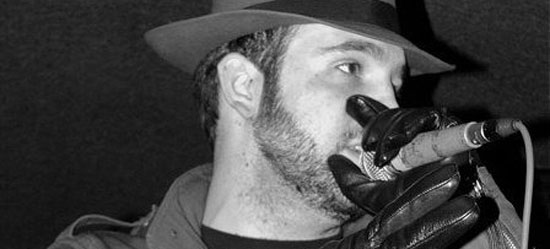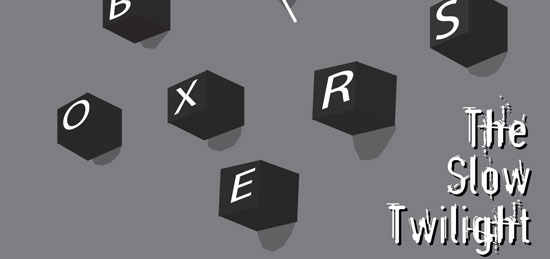Zilla Rocca on DIY Hip Hop Everything
Posted by Justin Boland on May 24, 2010 | 0 Comments

I first heard of Zilla Rocca through his recent work with the 5 O’Clock Shadowboxers, but I’m an ignorant hick: he’s been paying dues in Philly for many years now. He’s been in and out of dozens of projects and groups, done hundreds of shows and even founded a label, Beat Garden Entertainment. In short, he’s exactly the kind of business-minded hip hop head Audible Hype exists to spotlight and/or shoot the shit with. Zilla Rocca is an experienced entrepreneur with an interesting perspective on the game-this is definitely a dope read. Enjoy.
After the release of The Slow Twilight, what are the most important lessons you learned about preparing for an album release?
Zilla Rocca: I put out about 8 projects in various groups prior to The Slow Twilight. They were all a learning process. I’m not a marketing or promotions guru, and we had a budget of—you guessed it—not anything. The Slow Twilight was the first time I worked with a publicist and the results were staggering in the sense that he was able to open up doors that were previously locked. But because I didn’t have NahRight co-signs and I wasn’t signed to a label, the record didn’t set the world on fire. It slowly slowly slowly burned. It found the right audience and it was able to get a second and third life as months passed. I wasn’t used to maximizing a project or staying with it that long after it’s release, especially doing hip hop through the internet, where constant content is now the norm and timeless stand-alone projects aren’t the focus. But that record helped me understand that unless I have serious muscle behind me, whatever I put out will spike, then trickle. You can do an album release party and shows and all that but 3-4 months later, you’re already thinking about the NEXT project. My job is to now embrace every last set of ears that hear it for the first time, whether it’s the release date or 8 months later. It’s like The Dude says, “Strikes and gutters, man. Ups and downs”.
Do you think there’s any way around the “spike, then trickle” response that a new release gets in 2010, or do you think that’s inevitable?
Zilla Rocca: I remember reading an interview years ago when the record stores first started closing down. It was with this guy, think he was in Chicago, who said back in the day, in the 70’s, when an artist had a hit single, the album had been on the shelves for weeks or months. It wasn’t this massive build-up to first week sales only. In reality, unless you’re Wayne or Drake, you’re not gonna have a massive response immediately. If you’re online heavily, over time you’ll see spikes in your numbers because some Hungarian site linked to you and you got 800 hits one day, or some bootlegger in Asia posted your joint and suddenly your DL link has an extra thousand hits. This takes time, like the old record store owner said. The emphasis on constant numbers and hits leaves people feeling less than, or unsuccessful, because there are now finite numbers attached to their art. Some of the greatest, most influential hip hop albums ever spiked then trickled, like Reasonable Doubt, Illmatic, Three Feet High and Rising, etc. None of them sold a tenth of what Vanilla Ice sold, but where is he and where are those guys today? In 2010, there’s more choices than ever, but if you make a great project, people will find it—it just may not be for 6 months.
You’ve built your own publicity platform, Clap Cowards, and your content is way above par. Is that a format that evolved over time, or is delivering way more content/value than average part of your game plan from the start for that blog?
Zilla Rocca: I’m glad you like the blog! My blog started back in ‘08 because of the good feedback I was getting doing a guest column at Passion of the Weiss called The Beat Generation. I’ve always been a writer outside of making hip hop, so I figured why not go full steam with it? Before I strated the blog, I studied others to determine what balance I wanted to strike in terms of content. Most hip hop blogs are promotional vehicles for an artist, or they serve as listening/viewing stations for the newest mp3s and videos. I wanted mine to obviously promote my projects, shows, etc. but also engage readers and entertain them. I studied Joe Posnanski’s blog—he’s the best sportswriter in the country and now a chief writer for Sports Illustrated. His blog serves as soundboard for his thoughts on football, on his favorite candy bars, on the suffers of following the Cleveland Indians, whatever. Because I like him as a writer and he delivers thought-provoking, entertaining content, I now am FULLY interested in buying or reading the many books he’s written. I wanted Clap Cowards to serve the same purpose, so instead of just posting links to my YouTube videos or fliers for shows, I might write about my favorite players in NHL ‘96 for Sega Gensis or review movies or write a fake advertisement for the Rae-Rhyme-A-Rator, a machine that translates text into Raekwon-approved slang. It’s about engaging listeners, readers, or fans beyond an MP3 and trusting that someday they’ll WANT to support me based on the non-rap related content I post. I don’t like being a used car saleman.
What promotional methods have you abandoned in the past year? Bonus Round: What promotional methods would you like to see everyone else abandon ASAP?
Zilla Rocca: Although statistically it’s still valuable, I deaded the MySpace promotion. At one point I was running 7 artists’ MySpace pages for my old label—updating blogs, pics, posting bulletins, etc. Now it’s like Spam Depot for shitty bands and garbage rappers. I feel like I have enough online things happening where people can find it anyway, whether it’s CD Baby, iTunes, Twitter, Facebook, the blog, Bandcamp, Last FM, etc. I also decided to cut out contacts who realistically have never and will never help me out. I had to focus my efforts on crowds and likeminded folks who understand my aesthetic rather than be chummy with fools who are frankly using hip hop as a hustle and don’t connect with my direction. If I don’t like someone’s music, I’m not going to befriend them or pander for future favors because that’s not honest. I see too much of that, especially on Twitter and in the comment sections of big name blogs. I want that to be abandoned. People rarely comment or applaud you out of genuine interest or fandom on these sites. It’s about redirecting your shine onto them or them feeling obligated to big you up because you have something they don’t have and they want a piece. There’s too many participants with too many agendas.

You mentioned your “old label”-is that a project you’d tackle again, or a learning experience that belongs in the past?
Zilla Rocca: My old company/label, Beat Garden Entertainment, was my attempt at making the Def Jux of Philly. It’s definitely something I’m not interested in reviving. It served it’s purpose, but I learned that I’m NOT in a position to put other people on nor have a hand in 9 people’s careers when I’m not where I want to be yet. We started it as best friends trying to combine resources and link up with other talented cats in the area. By the end, it felt like a bullshit job you dread waking up for in the morning. For the first time in my music making life, I’m completely solo looking after my own music exclusively. I’m now an artist first, something I haven’t been since 2005. My personal and musical life both have prospered because of that shift in time and energy. I like to collaborate and consult but I don’t like doing for others what they can’t do for themselves.
What does your team look like today? How many people are involved in your operation?
Zilla Rocca: My operation today is streamlined, mainly just friends who know and understand where I want to go. It’s awesome! My manager Dom P of Public Axis LLC tackles administrative stuff, legal stuff, plus booking and all the tedious crap I don’t feel like doing lol. He does 50% of the work and I do 50% of the work, so there’s ownership and accountability on both sides, something I enjoy. Curly Castro is my a-alike—he’s a tremendous emcee and close friend. We’re totally on the same page with philosophy, tastes, and basketball. He gives me advice and guidance with my music and I do the same with his music. And we perform together and work on projects effortlessly. It’s not a competition, something you rarely find when dealing with rappers. My girlfriend handles my photos and is good for quality control—if she likes a song, there’s a good chance I’m onto something. She was the female in the video for “High Noon”. Plus she’s into the art world and is always putting me onto things I haven’t seen or heard yet. I also have Jeff Weiss in Los Angeles, who is an incredible writer for the LA Times and LA Weekly. He just gives me flawless advice and A&Ring here and there—he’s always a step or two ahead. And lastly my buddy Fresh at 33jones.com, he puts me up on other upcoming artists and opportunities that again, I might not have known about. It’s pretty tight, and there’s no formal stuff or contracts locking these people in. Everything’s done out of respect and excitement, which is all I want.

A question I’ve been asking people a lot lately: do you think live shows are still an avenue for getting paid? Has your experience been mostly positive or mostly exasperating?
Zilla Rocca: Live shows, at least for hip hop in Philly, will NOT get you paid, whether you draw 50 people or 5 people, opening or headlining. That’s just my experience here. I’ve focused my energy on out of state shows—I played LA in April and the experience was a 180 in every regard. I’m interested in playing non-traditional hip hop venues now: art galleries, bars, fesitvals, museums, lineups with non-rap groups, etc. I’ve noticed that the audiences at these places WANT to reward you for your performance, so even if I play the show for free, I’m selling CDs and gaining new fans. At rap shows in Philly, I’m performing for free….for other rappers.
What’s the overall feeling like in the Philadelphia scene, in terms of Hip Hop As a Career? Do folks still feel confident that they can make a living at this in 2010?
Zilla Rocca: There’s 6 million people in Philly and it surrounding areas and 2 million of them do hip hop in some facet. I think cats in Philly believe they can make hip hop their career, but to be frank, outside of a few guys who have already cracked the code, they’re not doing anything exciting to draw a national or international audience. They’re confident in their skills for sure, but they play in front of the same crowds. They don’t have a consistent online presence. They don’t have a dependable and forward thinking team around them. They feel entitled or slighted way too often. They’re doing whatever the times call for, but 2 years late. LA and the Low End Theory crowd—that’s exciting. All the amazing rappers and producers who drop quality music from Detroit and stick to their guns—that’s exciting. The Blakroc/24 Hour Karate School stuff bubbling in NYC with Dame Dash and Ski Beatz—that’s exciting.
When people get excited, it creates a scene, and eventually, outsiders want a piece of it and most importantly, pay you for your particular flavor. Look at Seattle rock in the early 90’s. Look at New York indie rock in the early 00’s or NYC indie rap in the late 90s. Look at Houston rap in ‘05. We had that with State Property and Neo Soul but those days are long gone. Philly has so much talent but everything’s splintered. Everyone says how we should “support our own” but no one owns that mantra, it’s just an easy catch phrase to say. I was a part of it, and I can say firsthand there’s no way to make a living from music under those conditions. You need to stand out from everyone and bring your style to people who value it, so you might have to try unorthodox stuff that isn’t a sure bet. You need to take chances, stop being complacent, do stuff for free, treat people with respect, and create a package that is undeniable and EXCITING so that you CAN make a living off music. I think that’s true anywhere.

